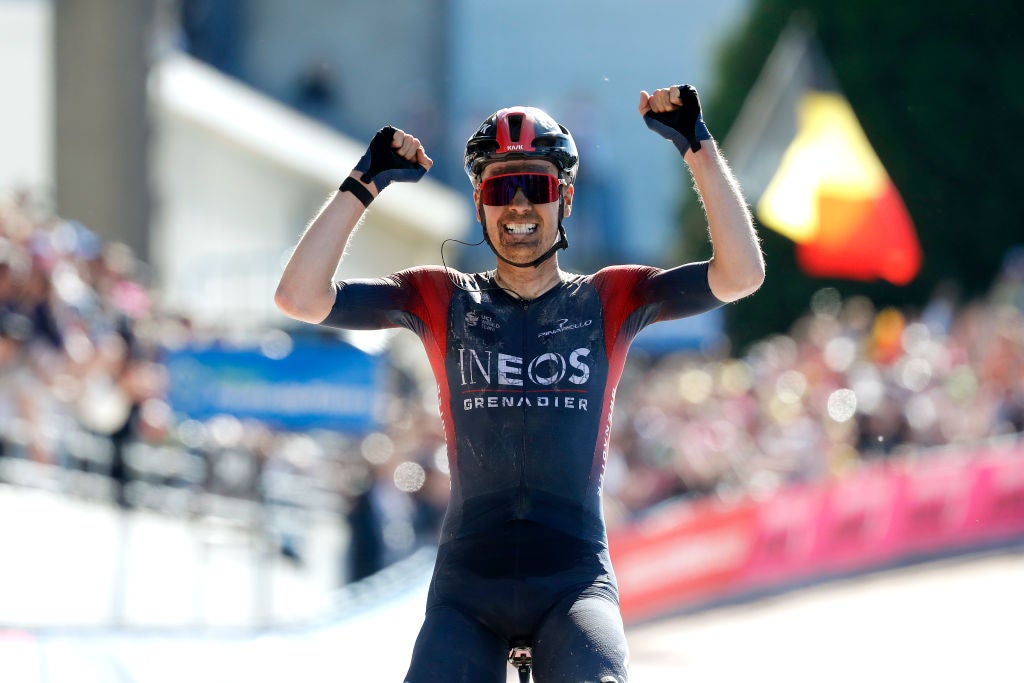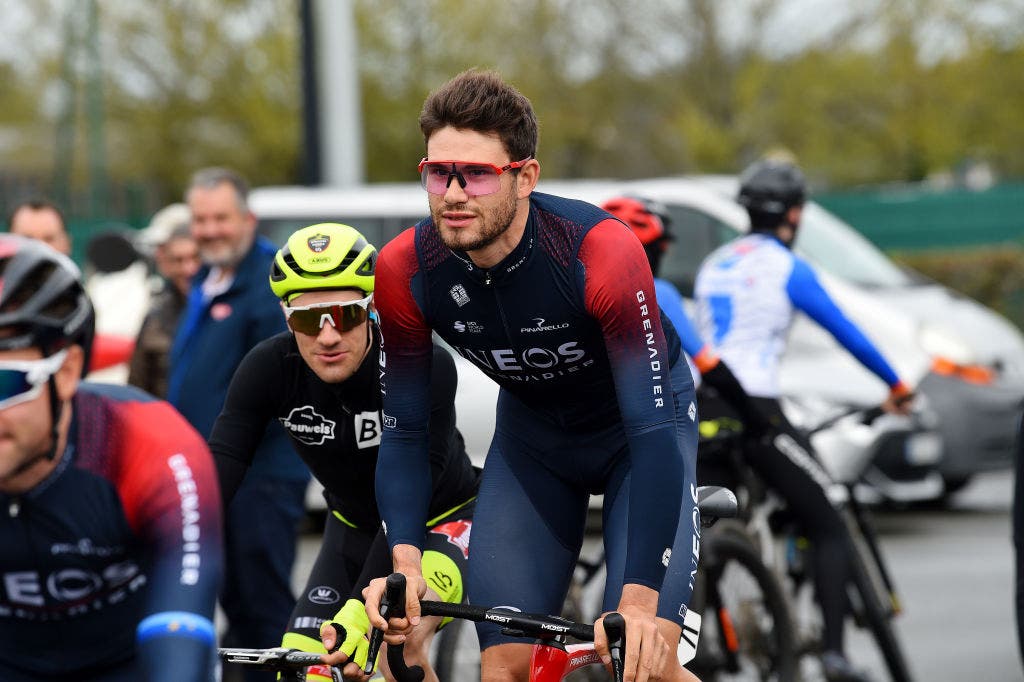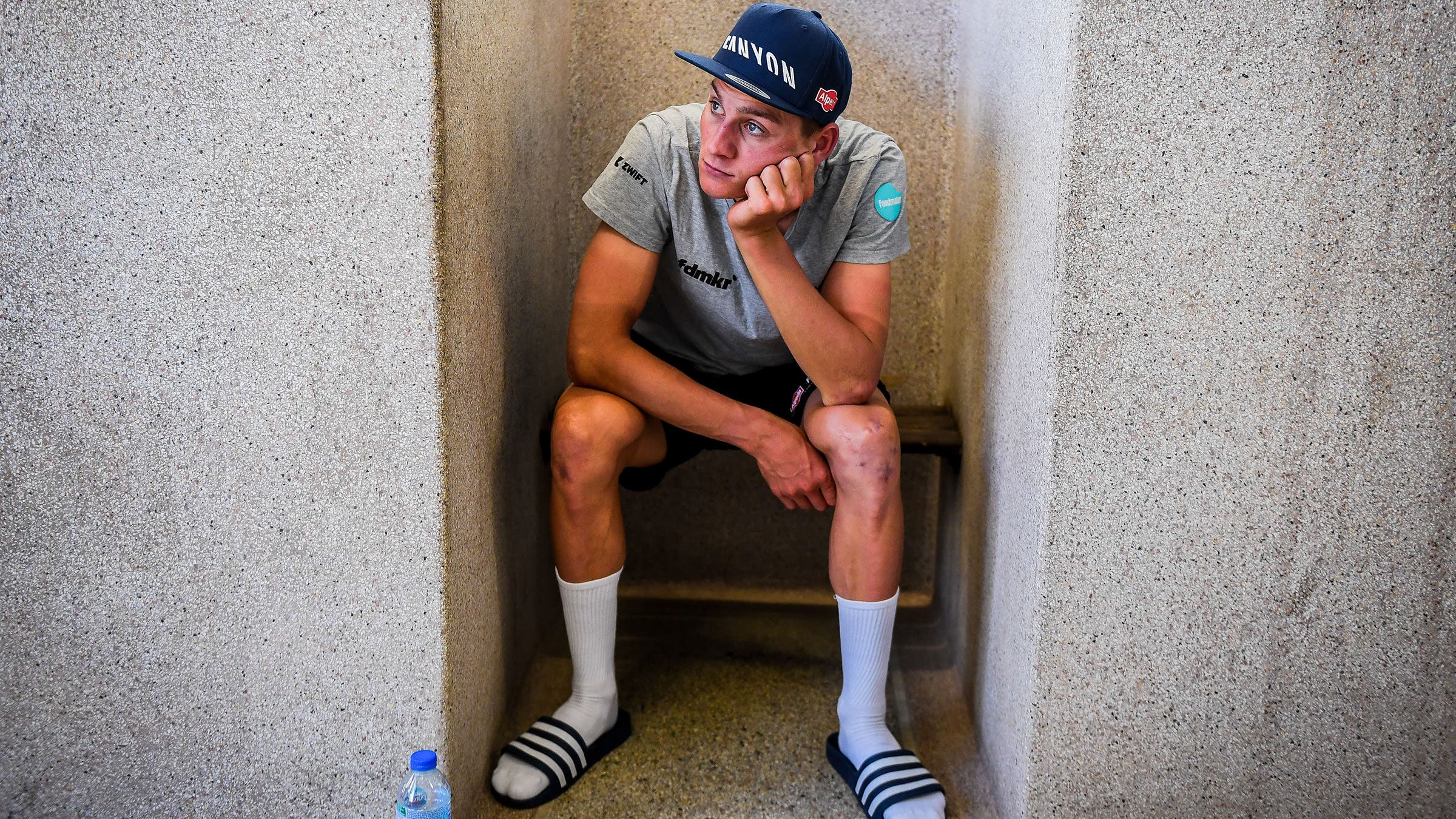Paris-Roubaix: Five conclusions from the men's race

ROUBAIX, FRANCE - APRIL 17: Dylan Van Baarle of Netherlands and Team INEOS Grenadiers celebrates winning in the Roubaix Velodrome - Vélodrome André Pétrieux during the 119th Paris-Roubaix 2022 - Men's Elite a 257,2km one day race from Compiègne to Roubaix / #ParisRoubaix / #WorldTour / on April 17, 2022 in Roubaix, France. (Photo by Bas Czerwinski/Getty Images) (Photo: Getty)
The men’s edition of Paris-Roubaix didn’t need poor weather to deliver an epic race with Dylan Van Baarle (Ineos Grenadiers) winning his first monument with an impressive attack 19km from the velodrome. There were several important storylines and subplots within the race, and VeloNews has picked out five of the biggest.
Van Baarle delivers with anticipation and execution
In a recent interview on the Bobby and Jens podcast, Jonathan Vaughters opened up about the pain of losing riders to financially stronger teams. It’s a pattern that Slipstream has become accustomed to over the years, and the podcast episode almost felt like a premonition ahead of the weekend with Vaughters left to watch a racer he once managed, and even coached, solo to a well-taken monument win.
Wind the clock back though, and few gave van Baarle much of a chance when he decided to leave Slipstream and move to Team Sky. The consensus at the time suggested that van Baarle would sink under the pressure to perform as a domestique. While it’s entirely fair to argue that he does have a key role in grand tours, just as Michał Kwiatkowski does, it’s hard to back up any suggestion that van Baarle’s classics career has suffered as a result of being a better all-round rider.
This campaign has simply seen the 29-year-old deliver on all that early promise first spotted by Rabobank and then nurtured by Vaughters. The Dutchman has made that step from being a consistent one-day presence into a complete leader. It hasn’t happened overnight, and much like his own team’s trajectory, this has been a long-term process.
Van Baarle had knocked on the door at the Tour of Flanders a couple of times — he’d won Dwars door Vlaanderen just last year, and finished second at the world championships — but on Sunday we saw a more assured, confident, and complete van Baarle.
Second in Flanders a fortnight ago was a clear indication of his form, and the collective might of Ineos certainly made life easier but when it came to the crunch van Baarle was flawless.
Ineos blew the race apart in the cross-winds, but while Ganna and Kwiatkowski faded through crashes and mechanicals, van Baarle eased back into contention after his calculated bike change. He was present in the group of contenders at the next key split and then attacked solo through Auchy-lez-Orchies. We’d seen van Baarle make these sorts of forays before — his playbook often involves an early attack in order to anticipate the major favorites — but this was different. He was racing his race at a controlled pace while others scrambled around him. When Mohorič drifted off the front with Lampaert through Cysoing, the Ineos rider seized his moment and he couldn’t have hoped for a better set of companions.
Mohorič had already spent several hours off the front, while Lampaert used his one bullet wisely to ensure that he was in contention for a result of any kind. The Belgian, at no point, looked like a potential winner. These three shared turns, knowing that if they kept van Aert and the chases at bay then a podium would soon come into view.
Then, on the hardest remaining sectors, van Baarle stretched out a slender lead with 19km to go. It wasn’t a violent kick but an assured push – pedal stroke by pedal stroke. Mohorič hung on for as long as he could but eventually van Baarle relentless grind proved too much. Game over and a win that put van Baarle in a new bracket as a rider. He’ll no doubt return to domestique duties in the summer, and who knows where he will race next year, but as a classics rider, he has well and truly arrived.
Ineos make the next step in the classics evolution

When Team Sky burst onto the scene in 2010 they tried to master everything at once. Their inaugural roster saw them splurge ridiculous amounts of cash in almost every department as they signed up riders they didn’t need, and certainly riders they didn’t know what to do with at the time
Mat Hayman, Chris Sutton, Juan Antonio Flecha, and Edvald Boasson Hagen led the line in the classics, and while there were flashes of brilliance it quickly became apparent that the team’s main ambition was to focus almost exclusively on the Tour de France yellow jersey. They didn’t sign a proven classics contender even when the likes of Boonen, Terpstra, Sagan, or Cancellara became available.
The squad still had a decent core for the classics through the years between 2010-2020 and riders such as Ian Stannard, Geraint Thomas, and Kwiatkowski often flew the flag admirably but there was often a sense of what could have been in many of the cobbled races. Bringing on board Tom Pidcock was a sign of intent, but the real cornerstone of the success in the classics this year has been down to the fact that the new generation of Pidcock, Ben Turner, and Magnus Sheffield have all hit the ground running and formed dependable bonds with the more established riders. They cleared out the deadwood like Moscon, and throughout the campaign, the team has made improvements at every turn.
On Sunday the team put in their most comprehensive performance yet. Everyone knew their job, from the excellent Cameron Wurf, to Turner and Rowe, who both played excellent cameos. Even after they showed their intent by blowing the race apart in the cross-winds, the team remained resolute after several factors went against them.
Ganna, Kwiatkowski and even van Baarle all had setbacks. Sheffield, Turner, and Wurf were tangled up in crashes, but there was a sense that no matter what happened the team would find the right answer and drag themselves back into contention. While Jumbo Visma faded during the race — in fact the entire spring — and Quick-Step ghosted its way through March and April – Ineos only got better.
There are relevant questions over the team’s grand tour ambitions for the next couple of seasons but in terms of the classics, this is easily the best squad the team has had since forming and with so many young faces, and van Baarle in what should be the peak of his career, the future looks incredibly bright.
Lampaert’s contract woes
In the blink of an eye, Yves Lampaert’s hopes of a podium place and a bumper contract at Quick-Step went up in smoke. The Belgian never looked like a genuine winner of the race but he rode intelligently and saved his one shot for when it mattered most. A top-five at worst looked on the cards for the Quick-Step rider until a spectator provided a perfect demonstration of what a complete lack of self-awareness and responsibility looks like. How do you not know how long your arms are, and then deem it sensible to dangle them out in front of riders who are traveling at 45kph?
This matters little, now. Lampaert was lucky to escape serious injury but that will not sweeten the feeling of desolation this morning. The rider is out of contract this year, and with illness totally ruining his spring, he needed a result in Roubaix in order to bolster his negotiating power with Patrick Lefevere and rival teams. That opportunity has been lost, and while there’s the wider question about safety in races, the immediate question is whether Lampaert could have a legal claim for potential lost earnings. Unlike last year, when Tony Martin was taken out by another moron at the Tour de France, there has been little discourse about what happened to Lampaert, and according to Lefevere, he wasn’t even the only Quick-Step rider to be taken down in such a manner. This sort of incident shouldn’t be accepted as the norm until someone is seriously hurt.
Van der Poel runs out of steam

If you had offered Van der Poel wins at the Tour of Flanders and Dwars door Vlaanderen at the start of the campaign, or even as late as the startline of Milan-San Remo, he would have accepted within an instant. And it’s through that perspective that the Dutchman’s classics campaign should be assessed. He had no right picking up the results that he did given his back injury and the subsequent time off the back with rehabilitation.
Yet a podium in Milan-San Remo, two brilliant wins, and top tens in both Amstel Gold and Paris-Roubaix were a huge return all things considered.
Sunday was good, but not “van der Poel good.” Other than missing the first split he did very little wrong and it was simply a case of not having the juice to respond to key moves. There were times when he would try and reel in riders and then look around for help – a clear indication that he was racing on the defensive and unable to really take the race on.
On some level, it was a shame that we never really had the dogfight that was anticipated between van der Poel and van Aert on the cobbles but in another sense, it made the classics far more intriguing and exciting.
For van der Poel the aim now is to recover before building up towards his Giro d’Italia debut.
Intermarché are the real team of the Classics
Ineos Grenadiers won the most, van der Poel claimed an emphatic Flanders title and Matej Mohoric blew everyone away in Milan-San Remo. Jumbo Visma looked dominant early on and man-for-man Ineos were the complete classics contingent but for those who cheer for the plucky underdogs, it was Intermarché-Wanty-Gobert Matériaux that came away as the team of the classics (so far). They punched well above their weight and frankly embarrassed several of their rival teams.
Alexander Kristoff won Scheldeprijs on his own — still not sure what happened there — while Biniam Girmay provided the best moment of the spring with his truly monumental win in Gent-Wevelgem.
In Paris-Roubaix though it was the collective that stood out rather than the individual performance – although Tom Devriendt was incredible in his own right. To give you a sense of perspective, Intermarché had six of their seven riders in the top 24, and two of that number in the top six. Devriendt led the race solo at one point, for heaven’s sake.
Compare that to Astana, a team that didn’t post a rider in the top 90, or Lotto-Soudal with its one rider in the top 30. Better still, compare the result to Quick-Step, as the top-ranked Belgian team is was unable to animate the race with anything like the consistency of their smaller national rivals over at Intermarché.
There was an argument that Intermarché would chase points rather than wins this season but that looks drastically unfair now given the wins and the results that the team has generated over the last few weeks. They’ve raced methodically but at the same time have lit up races as and when they can. All but a handful of teams would trade places for their classics results at this point and the management, as well as the riders, deserve a huge amount of credit.